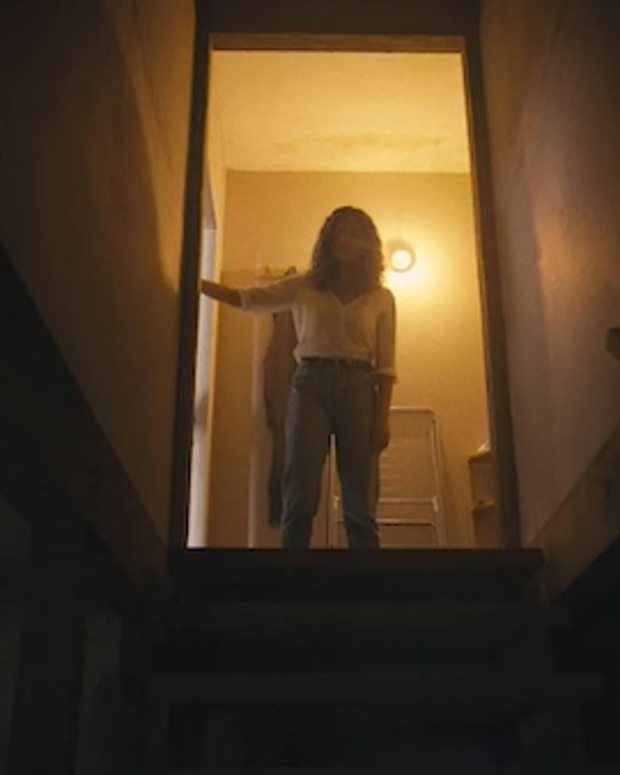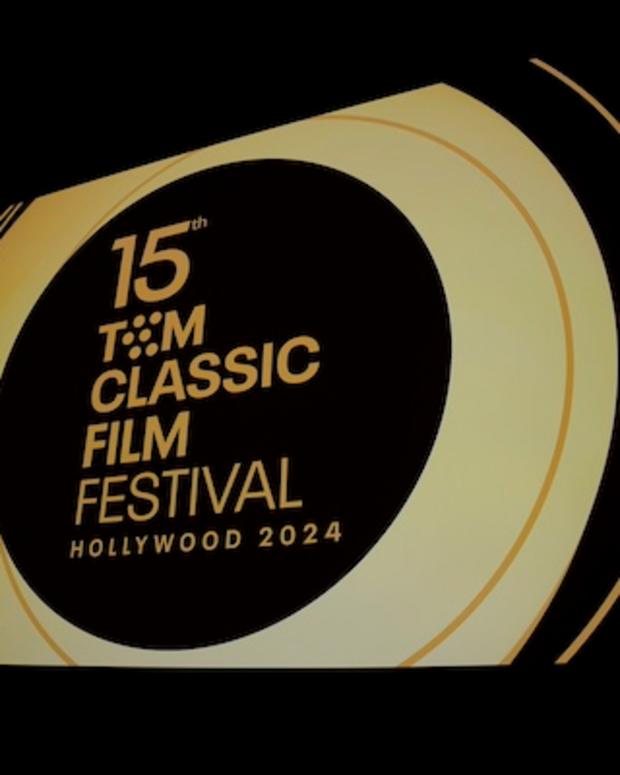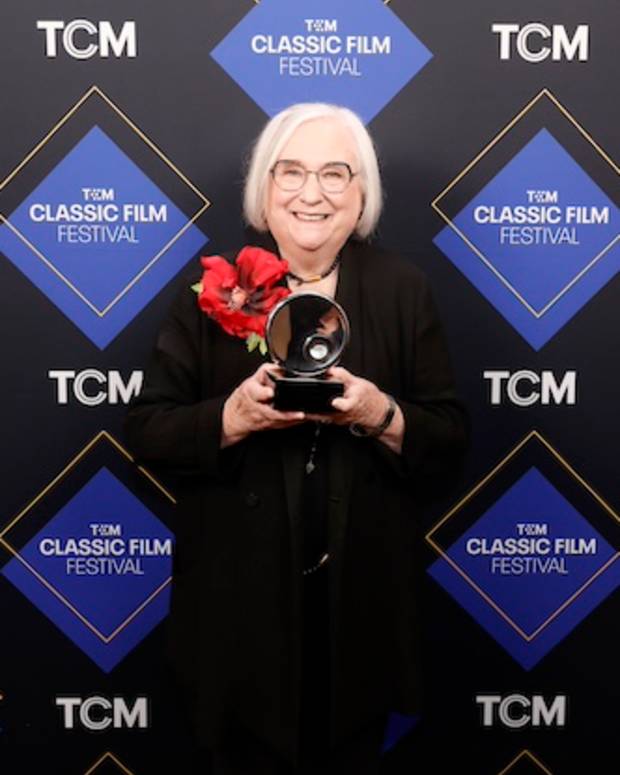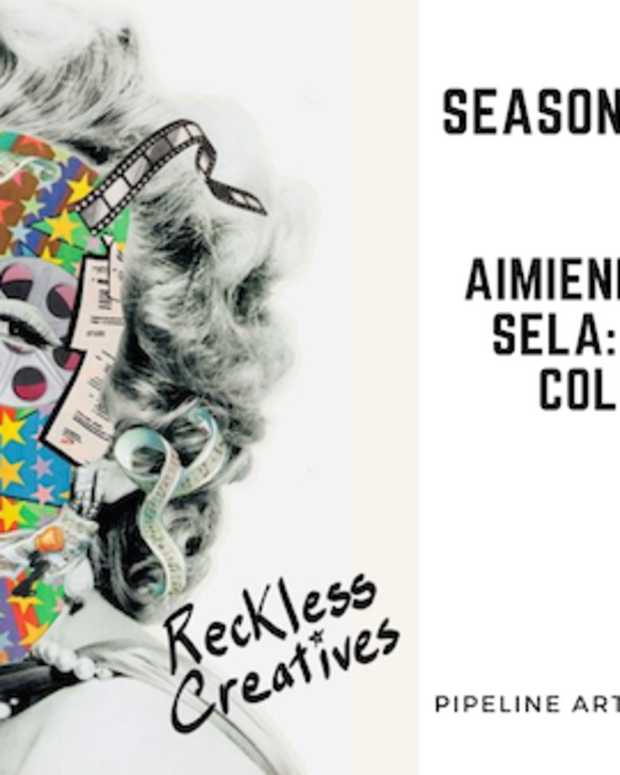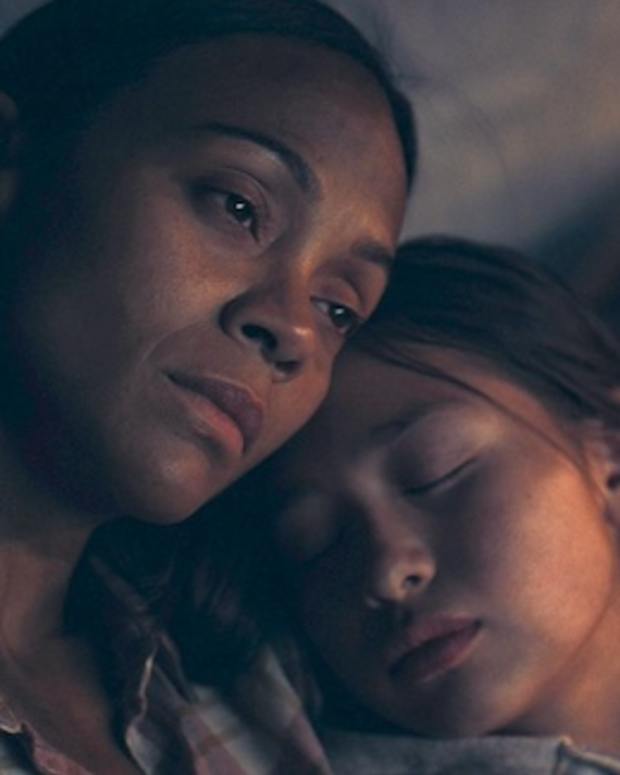INTERVIEW: The Wibberleys On Rewriting, Partnerships & Screenwriting Survival
Natalia Megas is a Washington, D.C. freelance journalist who turns biographies and ripped-from-the-headlines narratives into screenplays that have won awards and placed in contests like Austin Film Festival, Sundance Labs, and PAGE International. You can follow her on Twitter @DameWriter.
Click to tweet this interview to your friends and followers!

On the set of their TV show 'Common Law' with (from L to R) Karim Zreik, Cormac, Dan Shotz, Marianne, and Jon Turteltaub
Marianne and Cormac Wibberley, aka the Wibbs, are a Hollywood screenwriting duo who are so accessible and friendly on social media, I had to triple-take their Twitter profile after they congratulated me on my screenwriting contest placements – a success that pales in comparison to their 25-year career which includes movie credits like National Treasure and its sequel,Bad Boys 2, Charlie’s Angels: Full Throttle, G-Force, The Shaggy Dog, and I Spy.
The Wibberleys, screenwriting professors at their alma mater UCLA, are a wife and husband scribbing team from Southern California who according to the LA Times in 2014, radiates a more “sun-and-surf” than “just-off-the-lot” air about them. I didn’t have the honor (or the skymiles) of meeting them in person, but I did have the unique opportunity to pick their brains about the craft and business of screenwriting over our recent email exchanges.
Natalia Megas: Screenwriters have been known to take different routes to getting noticed, and hopefully getting hired or their screenplays produced. How did you become screenwriters?
The Wibberleys: Like all screenwriters, we started pursuing this career because we love movies and wanted to be a part of creating them.
Cormac first worked in the business affairs side (at ABC) but eventually made the shift to the creative side back in the early 90’s when he landed a job in the Saturday Morning Cartoons department. Remember them?
Marianne also decided against pursuing a graduate degree in Math and instead applied on a whim to UCLA’s Film School. When she was accepted in 1990, that was our first “big break” into Hollywood.
Yes, you can learn a lot of stuff in film school but more importantly film school is where writers can make contacts and get a shot at exclusive competitions. We met our first manager because Marianne won The Jack Nicholson Screenwriting Award. She also quarter-finaled in the Nicholl’s Fellowship.
That manager was a young and hungry guy by the name of Jeff Robinov (future president of WB) who had started his own tiny management company called The Robinov Company. Like us, he was just starting out. He had beach chairs in his office, but we thought (and still do) that we were the luckiest people to have someone like him advocating for us.
NM: Which came first: Marriage or the writing duo?
TW: Hometown sweethearts, then marriage, then baby, then screenwriting.
NM: Two years after becoming a screenwriting duo, you had your first spec script sold to Disney. It seems like instant success. What am I missing?
TW: Although it looks like instant success (we sold the second spec we wrote together) it was actually years of reading scripts and watching movies and then two years of film school for Marianne, where she wrote three scripts (on which Cormac gave her notes), and two years of Cormac being a creative exec at ABC, where he gave numerous notes, until finally we were able to sort of understand what a “high-concept” was and then wrote one and sold it to Disney. So like most things, it happened gradually — then all of a sudden.
Read more on what a high concept script can do for your career.
NM: 6th Day was the film that jump-started your career in 2000. What was that first experience like?
TW: Well, it did indeed jump-start our career, but, like most things, not the way we expected. After we sold our first spec, which was a kid’s movie, we noticed that we weren’t getting put up for rewrites on jobs – even ones for kid movies. The writers that were getting those jobs all wrote in the action genre, a genre we love.
So we decided to write an action movie. But before we wrote it, we wanted to make sure the concept was interesting. So we worked out a long, detailed pitch and went out on the town and pitched it to anyone who would listen. Everyone passed. One person even fell asleep during the pitch. Not exaggerating. But after everyone had passed, we still believed in the idea and decided, since the story was all worked out, we should just write it. And so we did.
We honestly did not expect to sell it. We just wanted a sample to show we could write outside the kid’s genre. We never thought we’d sell it or it would get made.
Getting a movie made with a major movie star really changed everything. It’s the Golden Ticket. That’s when we started getting consistent writing assignments.
NM: National Treasure. You were brought into the project a few drafts in. How much research did you do to come up with the idea of the treasure?
TW: The audition process for this movie was grueling.
First, our agents told us not to take the job because it’d been in development for years with lots of writers taking stabs at it before we came on. It was never going to happen, according to them.
But we loved Jon Turteltaub’s movies so we wanted to give it a shot because we wanted to work with him.
We still remember working out a detailed pitch for Jerry [Bruckheimer] after which Jerry gave us his Southern gentleman smile and said, “You don’t have it yet.”
We left thinking we’d lost the job, but Mike Stenson, one of Jerry’s executives, chased us out, saying that Jerry really liked us. Honestly, we did not see it (laughs).
For a week or so we researched historical treasures, trying to find one that was not only big but also tied into the theme of the movie. After some extensive (pre-wiki and pre-Google) internet searches, we came across the Templar treasure.
So we went back a few days later and pitched again to Jerry, this time using a one-dollar bill we borrowed from Mike as an example of the everyday items we’d infuse with hidden codes in the movie. (BTW, this was all before The DaVinci Code was published.)
Jerry loved our pitch this time, but we always felt bad because we forgot to give Mike his dollar bill back.
NM: Mr. Wibberley’s father was a writer. Do you agree with your father, that writing is one of the hardest jobs out there?
TW: We assume you’re referring to Leonard’s [Wibberley, Sr.] quote to his kids, instructing them, “Never be a writer. It’s a whore’s profession.”
It’s funny looking back on that now, knowing that novel writing is considered so much “easier” than screenwriting because authors get to write whatever they want. Not true. Leonard was pressured by his agents and publisher into writing FOUR sequels to his famous book The Mouse That Roared, a 25-year-long chore he grew to loathe.
The truth is that all forms of writing have gatekeepers and someone “higher up” — an agent, publisher, editor, producer, studio executive or actor — telling you what you need to “fix.”
But that’s OK. You realize that writing is like any other job. Everyone has a boss.
Want to try writing a novel? Read Self-Publishing for Screenwriters... and for Sanity
NM: The statistics of screenplays that never get made is very discouraging (it’s like 98%). So, why should we even try?
TW: That’s a depressing statistic. In fact, one of our students said that to us last semester. We told him you can’t think about that. If you did, you’d just quit. The best thing to do is keep writing and learning and believing. It’s the only way to succeed.
Jon Peters once said something like “A Screenwriter is always only 10 weeks away from making it big in Hollywood.” It’s a reference to the fact that a spec script can be written in 10 weeks. We’re not sure of the exact quote. We’ve been trying to hunt it down. We think we read it in a book.
It’s really true.
And when your spec doesn’t sell, you have another shot in another 10 weeks.
NM: There are so many ways to tell the same story. How do you know when you found the best way?
TW: You never do. You never know. You just try to tell your story your way and hope you connect with readers who have money (laughs).
But when everyone passes, you cry and then you start over and write something new, and never give up.
NM: How do you deal with rejection?
TW: Give yourself 24 hours to be really super fucking depressed. Then start something new. Like we said, you’re always only 10 weeks away from someone connecting with your writing.
NM: Which screenwriting method do you adhere to? Blake Snyder’s Save the Cat? Syd Field? Joseph Campbell?
TW: We teach a 10-week course on this at UCLA. There is no short answer because we believe that every genre has its own unique method (i.e., structure and tropes that need to be played with and twisted).
We believe that it confuses new writers to tell them that there is one 3-act structure way of writing scripts because it’s just not true.
NM: Can you define that a bit further?
TW: First, we suppose, we should define what we think of as an act break: It’s any large shift that spins the hero’s life out of balance.
Not every movie has three acts, and not all acts are 30 pages for act one, 60 pages for act two, and 20-30 pages for act three. When you tell writers this, it puts storytelling in a box. And makes it almost impossible to write a 60-page second act.
For example, some writers believe Raiders of the Lost Ark has five acts. And The Incredibles and Finding Nemo have four acts. They both have a very short 5 to 10-minute opening “teaser act” then three more acts after that.
What we teach in our class is that story type (genre) dictates structure (and therefore, act breaks).
This is what we teach on our first day of class:
Our writing process starts with knowing our genre. We define genre as “Story Type.” Examples:
- Romantic Comedy—The Wedding Singer
- Deception Comedy— Doubtfire
- Curses—Liar, Liar and What Women Want
- Point A to Point B—The Sure Thing, Planes Trains and Automobiles, Midnight Run.
- Treasure hunt—The Mummy, Tomb Raider, the Indiana Jones movies.
- Buddy cop—Lethal Weapon
- Rivalry—Election, Dodgeball, Pitch Perfect
- Drama is too all-encompassing, so it needs a sub-genre to define it (e.g., courtroom drama, survival, etc.)
- And to complicate things, these genres can be mixed and matched. For example, The Sure Thing is a rom-com and also a Point A to Point B story.
Once we know our genre/story type, then we research the conventions of that story type by watching every movie/reading every script we can find in it.
Need help defining and choosing genres? Get a free download with tips.
When you do this, you’ll find very similar beats in all the movies you watch within your story type.
Examples:
- Predator and Aliens have almost identical major story beats.
- Almost every kidnapping story has a scene where the kidnapper and the captive bond after getting high or something like that.
- Every curse movie has the hero getting cursed at the end of act one. The curse is also something that your hero’s characters needs to experience. For example, in What Women Want, Mel Gibson is a chauvinist who is cursed to hear women’s thoughts.
Once you have an idea of the conventional story beats of the story type you’re writing, you need to surprise your audience by twisting them.
- Paul Simon once said something about every musician using the same three chords to write original songs. This is where you start.
- William Goldman said, “Give them the expected in an unexpected way.”

Speaking at UCLA with Lew Hunter when they were presented with the Hunter Zakins Screenwriting Award in 2014.
NM: How much research do you do when preparing to write a script? Do you travel, visit libraries, talk to people, buy books?
TW: We do lots of research. We buy tons of books on Amazon, we Google, we Wiki, but we hate to travel, so we use GoogleEarth and read reviews on TripAdvisor a lot…
Cormac is an avid reader. He’s usually reading three books and a couple scripts at any given moment.
Marianne is more ADHD. She’s an internet sleuth who’s more likely to have ten active windows open on her laptop than books.
NM: What’s your writing process like?
TW: We outline. We like (hate) to pitch because you can tell by the reactions of the people you’re pitching to what’s working and where your story needs more work.
We do like the post-its method. You can stick them to any wall. No corkboard required.
We also take long walks with our two rescue German Shepherds and discuss story or what we need to write in the next scene.
NM: What’s your typical day like?
TW: If we don’t have meetings: Morning. Coffee. Review pages from the previous day and write new pages together in our home office with our dogs. Lots of “that’s a dumb joke” and “oh yeah? Well, you’re not funny either” until Lunch. Walk the dogs a couple miles. More coffee. Write in the afternoon. More insults challenging each other until dinner. Dinner. Research by watching movies in the genre we’re writing.
NM: How do you approach rewrites?
TW: From the characters. We get so many scripts that are filled with plotty plots and no character. We always say that people will watch any story as long as they’re engaged with the hero. What’s the hero’s problem? What does he/she think s/he wants? What does s/he really need?
When you come into a pitch for a rewrite armed with this, it’s much better than coming in with the hero does this, and then that, and then this, and then that.
This holds for anything you’re working on, by the way.
NM: What books do you recommend?
TW: We always recommend Story by Robert McKee, but there are good tips in all the books you mention. We also like The Moral Premise by Stanley Williams and The Third Act by Drew Yanno.
We were introduced to the last two books by Will Smith while working on a script for him at Fox called The City That Sailed, which is one of those scripts we never stop hoping will someday get made.
NM: What are the biggest pitfalls you’ve seen new writers fall into? What should writers be weary of?
TW: Writers tend to never want to give up on a script or idea that everyone’s passed on. They’ll keep rewriting it, hoping the new draft will be the draft that will get a bidding war. We always say, “You gotta let it go and write something new.” See Jon Peter’s quote (laughs).
Writers also tend to cling to faint praise. Don’t. If someone says they liked your script, but they don’t want to buy it, it’s as big of a “no” as a “no.” Write something new.
Writers are weary of contests and review services like The Black List because they cost money, but we believe there are good contests out there and pitch festivals too that are worth the money if you can afford them. You just have to find the reputable ones. We’re always asking on Twitter what’s good and what’s not.
Looking for a contest? Check out Screenwriting Contest Calendar Dates and Prizes!
NM: If you are a writer living outside of L.A. with an established career and family, what advice do you give to them (i.e. Me)?
TW: Competitions are good. The Black List too. Networking on social media. Querying managers with a killer letter and logline. Of course, finding managers who accept queries is a challenge. Again this is something we have been asking peeps about on Twitter.
NM: Can you give any tips for how to structure collaborate writing?
TW: Every partnership is different, but this look at improve by Tina Fey isn’t a bad approach to collaborative writing (click here).
Of course, we say “no” to each other’s ideas all the time, so there’s really no one way to collaborate!
NM: When one of you thinks this, and the other thinks something else, how do you come to a meeting of the minds? Do you need a “safe” word if one of you is writing too much from personal need instead of what’s best for the character?
TW: (Laughs) Some days we agree on everything, and others, we can’t agree on anything—even punctuation. Those are the hardest days. Each of us has stormed out of our office at one time or another. Sometimes you manage to convince the other that your idea is better (laughs) and other times you just agree to disagree. Then you take turns who gets this one and who gets the next one.
But in meetings, you always support each other. Every idea (good or bad) was the idea of both of you. #unitedfront
NM: Do you work independently as well as a team?
TW: No, we’ve always worked as a team. Even when Marianne was in film school, Cormac was helping her with her scripts.
Read a variety of ways to structure a writing partnership.
NM: What’s your best buddy writing advice when both writers are not in the same zip code?
TW: Can’t answer that one. We’re literally never more than 25 feet apart from each other.
NM: What’s your main ingredient to becoming a successful screenwriter?
TW: We were once told by a studio exec that in screenwriting, there are three types of writers: starters, middle relievers, and closers.
That is, there are great concept writers, writers who lay down solid story foundations, and closers—the writers who polish with amazing dialogue and character arcs.
As writers, you should consider yourself to be lucky to be thought of as any one of these players because they are all equally important.
NM: How would you describe Hollywood in three words?
TW: “Nobody knows anything” — William Goldman
Or…
“No… no… maybe.”
NM: If you had to put your lives as screenwriters in a logline, what would it be?
TW: A couple realizes the only way they can survive is if they spend 24-7 together for the rest of their lives.
NM: If you could give your younger screenwriter-self advice, what would it be?
TW: When they buy your spec script, it doesn’t mean they love you. Or even like you. Or your script. They might just like the idea.
You will get notes. Lots of them.
It sucks, but if you make it through it, the process will make you stronger and a better writer.
NM: What have you learned since becoming screenwriting professors?
TW: We’ve been reminded of what it was like just starting out and how hard it is to break in. It’s not easy getting your script into a power broker’s hands, even if you’re talented.
It’s also made us more active on social media trying to help aspiring writers.
Mostly, we’ve realized that some people are naturally gifted writers and some are not—but that doesn’t mean writing can’t be taught. It’s an art, but it’s also a craft and many aspects of the craft can be dissected, studied, and learned.
NM: What are you working on now?
TW: We just finished The Nutcracker & the Rat King at Paramount. It’s a modern adaptation of the classic story about the war between the toys and the rats set in New York. Unfortunately, Disney’s Nutcracker beat us to the green light, so it’s unlikely our version will ever get made.
That’s the life of a working screenwriter. You write a lot of things that don’t get made. You move on. #10weeks
NM: Will we ever see Uncharted, the script based on the video game of the same title that you helped write?
TW: We sure hope so. Joe Carnahan is working on a new draft now.
As we were writing it, we did laugh at the thought that we were writing a movie based on a video game that was borrowed from a movie we wrote (as well as Indiana Jones, which we also borrowed from).
You can follow the Wibbys on Twitter, Facebook and Instagram @dottiehudson
The Wibberleys offer advice on resources to help you get that big break:
Diversity Fellowships:These fellowships are for URMs in Hollywood (that includes women and minorities—which includes Asians). There are programs for aspiring writers, directors, and (in ABC’s case) for actors as well.
Universal Fellowship
NBC or Writers on the Verge
ABC Diversity
Fox Diversity
WB Television Workshops
Screenwriting Contests: Entering contests is still one of the best ways to get exposure and cultivate connections. Here are a few of the best ones:
Academy Nicholl Fellowships
Sundance Screenwriters Lab
The Tracking Board Launch Pad has a script competition that we’re mentors for this year. They also have similar contests for books and TV pilots.
Story Expo has a pitch competition that our twitter followers have said is decent in terms of script requests + follow up meetings.
Slamdance
Emerging Screenwriters
Script Pipeline Screenplay Competition
Final Draft Big Break and Bluecat also seem to get results for their finalists according to our twitter followers.
The Black List: The Black List has become a go-to website for script reviews by pros (for a fee) as well as a shot at entering many competitions.
For a fee, screenwriters can upload their spec scripts to our database and have them evaluated by professional script readers. Then, subject to that evaluation and a recommendation algorithm, scripts are sent to a pool of over 1000 film industry professionals (including producers, agents, managers, and assistants).
Some Good Books on Screenwriting
Screenplay: The Foundations of Screenwriting by Syd Field (a best first book on screenwriting, format, and act structure)
The Art of Dramatic Writing by Egri, Lajos (does a great job of attacking story from theme)
The Writer's Journey by Christopher Vogler (boils down the Hero's Journey and character archetypes)
Story by Robert McKee (digs into what makes individual scenes work and building them into an overarching story)
Writing Screenplays That Sell by Michael Hauge (good introduction to "concept" and what producers are looking for)
Terminator 2: Judgment Day - The Book of the Film - An Illustrated Screenplay by James Cameron (a good one for action writing)
Instantly download tons of FREE screenwriting resources today!







